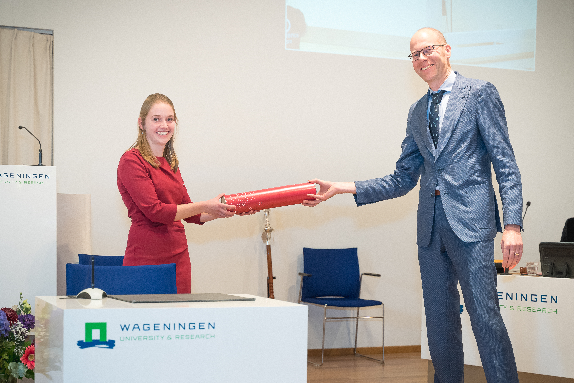PhD defence of Evelien Vaessen
The Probiotics project team of the project Low Energy Living Bacterial Food Formulations celebrated Evelien Vaessen’s PhD defence on Monday the 12th of October 2020. An online symposium titled ‘Spray drying of ferments and living bacteria’ was organized and of course the defence of Evelien Vaessen was held. The mini-symposium had four great speakers of which two were also part of the Priobiotics project team.
Mini-symposium
Martijn van der Hoeven from Nutricia R&D presented about ‘Fermenting more than yoghurts: infant milk ingredients produced by fermentation’. Isabel Siemons, Wageningen University presented about ‘Particle morphology linked to survival of lactic acid bacteria during drying’, the result of a joint study of Evelien Vaessen and herself. Prof. Romain Jeantet from Agrocampus Ouest in Rennes (France) presented ‘Improving the survival of beneficial bacteria during drying and storage by taking advantage of bacterial adaptation’. Finally, Rian Timmermans from Wageningen Food & Biobased Research, WUR presented ‘Applications of Pulsed Electric Fields for the Food Industry’ explaining also the possibility of using PEF as a pretreatment before drying to improve drying efficiency or product quality.
Thesis defence
In the afternoon Evelien Vaessen defended her thesis ‘Pulsed electric field pretreatment for drying of living bacteria’ successfully. Her PhD thesis is focused about how bacteria are commonly used in food industry as starter cultures or probiotic supplements. These bacteria can be stored in the powder form to prolong their shelf life. However, during the drying process bacterial inactivation occurs due to thermal and dehydration stresses. In her thesis Vaessen focused on a pre-treatment for the bacteria to increase their survival during subsequent drying processes. She provided a proof of principle that pulsed electric field (PEF) pre-treatment can be used to increase intracellular protective solutes concentrations in bacteria. This PEF treatment resulted in permeabilization of the cellular membrane upon which protective molecules in the PEF medium can diffuse into the cell.

Furthermore, Vaessen showed that PEF pre-treatment can lead to increased drying robustness of bacteria when the bacteria are dried in a reconstituted skim milk medium. These insights can be used to develop and optimize drying processes aimed at high bacterial culture viability. View her last publications on the latter online.
If you missed the thesis defence of Evelien Vaessen you are still able to watch it online on the Wageningen University webpage.
About Evelien Vaessen
Evelien Vaessen was born in 1992 in Heerlen. She obtained her VWO diploma in 2010 with majors in Nature & Engineering and Nature & Health. Hereafter she finished a bachelor in Biotechnology at Wageningen University with a thesis at the laboratory of Bioprocess Engineering in 2013 about the effect of lignocellulose derived compounds on Bacillus growth and acid production.
She continued with her master in Biotechnology with a specialization in Process Technology. Her MSc thesis focused on modelling and bioreactor experiments to understand the cell cycle of microalgae at the laboratory of Bioprocess Engineering. After this thesis Evelien moved to Portugal for her internship in the institute of iBET in Oeiras where she worked on upstream process optimization of insect cell cultures for the production of influenza virus-like particles. She finished her masters’ degree in 2015.
Evelien started as a PhD candidate at the laboratories of Food Process Engineering and Food Microbiology in 2016. Her research focused on a pulsed electric field pre-treatment to increase survival of probiotics and starter cultures during drying, and the results of this work are described in her thesis.

How Vaessen experienced working in ISPT project
I enjoyed my time as a PhD candidate a lot and the collaboration with ISPT and the project partners definitely contributed to my research and professional development. From the beginning till the end we had fruitful discussions with the project team. Most of these meetings we were present with 8-15 people, which resulted in many comments, ideas and questions about the research. These discussions helped me to get a better overview on different research options and the relevance of the project, but also helped in a practical way, with suggestions for methods etc. Furthermore ISPT provided a nice platform for networking and for presenting my research, for example during ISPT days or cluster meetings.
Read more about Vaessen’s work with ISPT here.
Acknowledgement
This project is co-funded by TKI-E&I with the supplementary grant 'TKI- Toeslag' for Topconsortia for Knowledge and Innovation (TKI’s) of the Ministry of Economic Affairs and Climate Policy.
